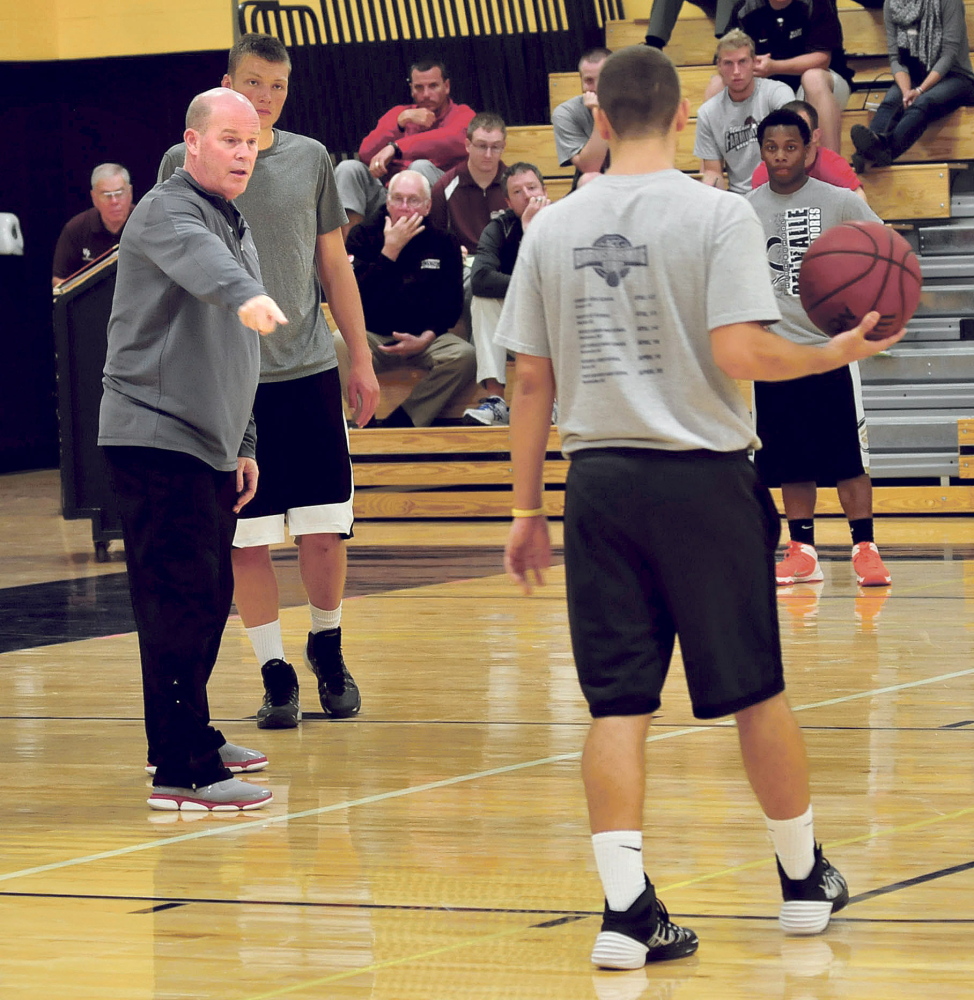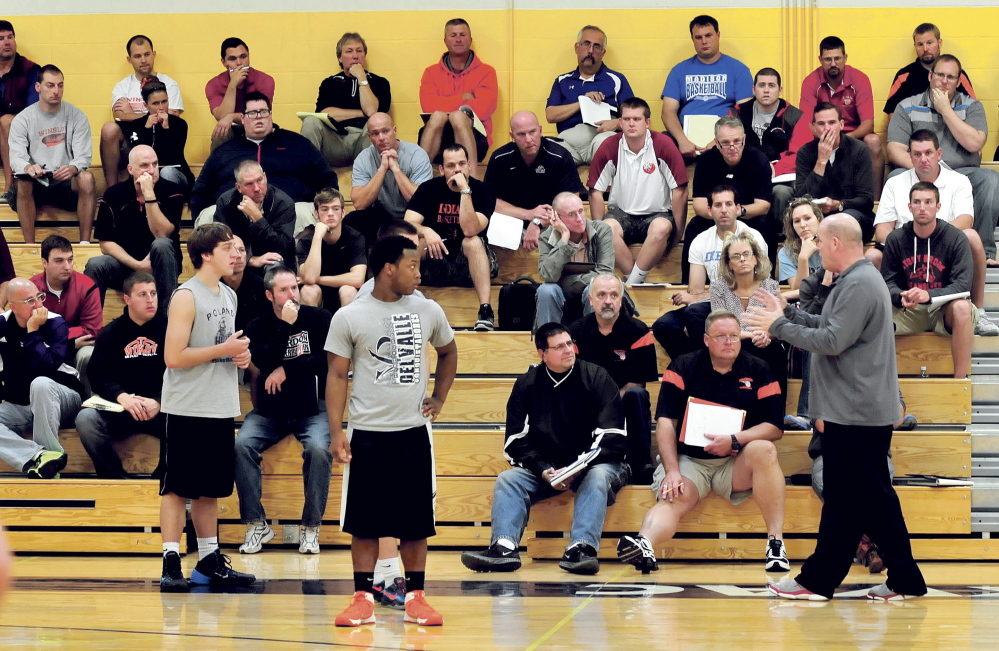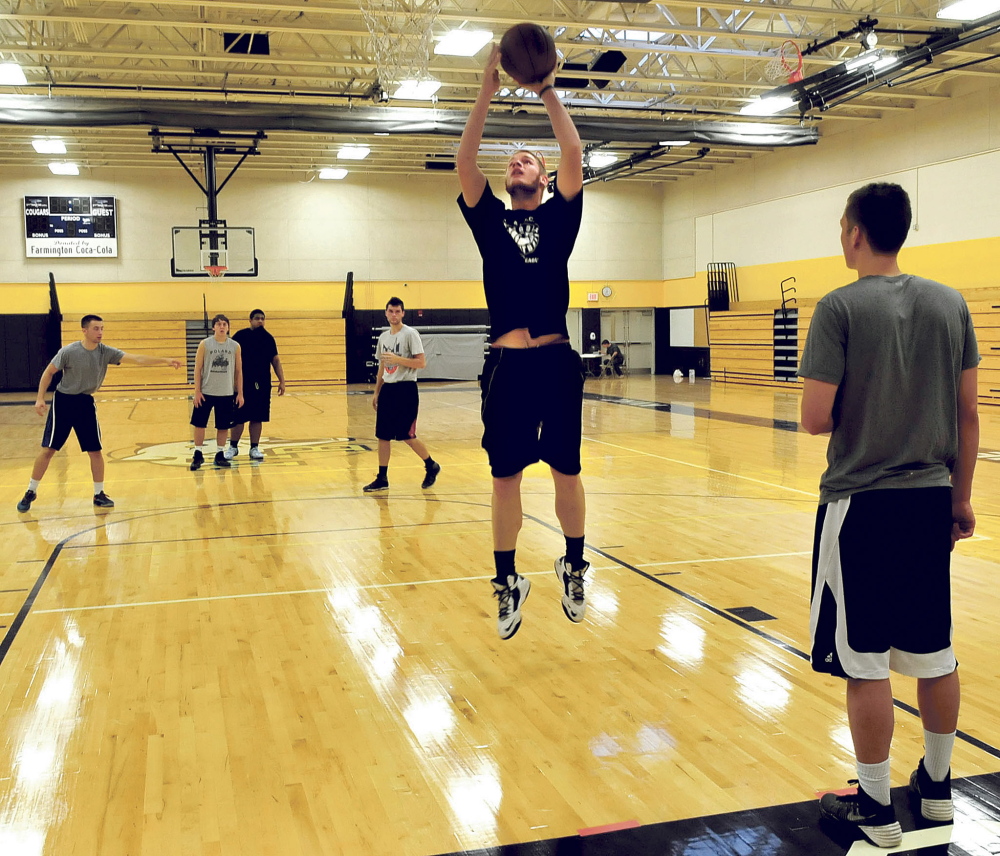FARMINGTON — There was a coaching clinic at the University of Maine the same day, but many of the best basketball coaches in the area were in the bleachers at Mt. Blue High School, paying attention and taking notes.
Colby men’s coach Damien Strahorn brought his notebook. Maranacook coaches Rob Schmidt and Jeannine Paradis were there too. So were Madison’s Al Veneziano, Winslow’s Lindsey Welch and Skowhegan’s Tom Nadeau.
The attraction was Steve Clifford, the Charlotte Hornets coach and University of Maine at Farmington graduate, who was in town to be inducted into the UMF Hall of Fame on Saturday night. On Sunday morning, he ran a clinic with current UMF men’s players.
“How can you pass up on an opportunity like this?” Strahorn said. “To be around a coach who has been in the NBA for so many years, and such a great basketball mind. It’s a great opportunity for coaches to learn.”
“First of all, it’s great to organize it, because it makes me sit down and think about things as we get ready for our season,” Clifford said. “So, selfishly, it’s a great thing.”
Clifford was an assistant coach in the NBA for several years before being hired to coach Charlotte prior to last season. He took a team that had gone 21-61 the season before and led them to a 43-39 record. Charlotte’s owner is NBA legend Michael Jordan.
“He’s great,” Clifford said. “Supportive. Helpful. He knows a lot about our team, and he wants to win. If you look at what he’s done, he’s so committed to our team, he signed two big free agents in the last two summers, Al (Jefferson) and Lance (Stephenson). It’s been great.”
Clifford spent the clinic focusing on offense, dropping quick bits of information to the players and coaches along the way. He began by breaking down the pick-and-roll, and talked again and again about proper positioning and spacing on the court, using the players to make his points.
“That’s what young players don’t understand,” Clifford said at one point. “Screwing up spacing has a lot more to do with losing than anything else on offense.”
Clifford made several references to young players doing things like elaborate dribbling but not knowing how to play because they don’t understand things like spacing. He recited numbers about how when Dwight Howard posts up with one foot in the paint, he scored about 53 percent of the time, but when Howard posts up with both feet outside the paint, that goes down to 44 percent.
“There’s a lot of little things that we already try to do with our program,” Paradis said. “It’s good little reminders on some things that I’m already doing, and maybe a way to change some of the things that I think that the kids haven’t just clicked with yet.”
When players executed the drills correctly, Clifford praised them, but he didn’t hesitate to lay into them when they messed up — admitting afterward that the harsh words were intentional to improve their performances.
“I don’t care how old you are. All you got to do is pay attention,” Clifford said irritatedly after players went the wrong way twice in a row. “We’ve already gone through that stuff. That stuff is to promote good habits — and you can’t have good habits if you don’t pay attention.”
Clifford used Charlotte players as reference points throughout the clinic, and also used the example of the San Antonio Spurs, the reigning NBA champions.
“If you watch San Antonio, they play with such pace,” Clifford said, before breaking into a laugh. “And they have three Hall of Famers. And everyone can shoot the 3. But that’s beside the point.”
Throughout the clinic, Clifford gave insight about what he had learned as a coach about dealing with players. He urged every coach in attendance to sit down for a couple hours and come up with a leadership philosophy. He related a lesson he learned from longtime Mt. Blue boys coach and current UMF assistant Jim Bessey: “How you teach them to play with each other dictates everything.” The lesson being, explain to a player what he’s doing wrong in front of his teammates, rather than telling him he stinks.
Later, Clifford said, “There’s nothing that rips a team apart more than if your best players won’t pass the pass to the players who aren’t as good. I don’t care what level it is.” He talked about “whisperers,” the players who make complaints in the form of side comments at practice or in the back of the bus.
“Don’t come off like you’re this great teammate if you’re whispering all the time,” Clifford said.
Through it all, the coaches took it all in, many drawing diagrams in their notebooks. They were students again.
“As a coach, we’re always aspiring to learn more,” Strahorn said. “Someone like Steve Clifford, just having a chance to come hear him speak, and talk about the game — there’s so much you can learn, no matter what level you’re at. It’s really, for me, neat to sort of see the things that he’s talking about that certainly apply to the NBA, but apply to the high school level. The game of basketball, the most fundamental aspects of it are the keys to winning.”
Matt DiFilippo — 861-9243
Send questions/comments to the editors.




